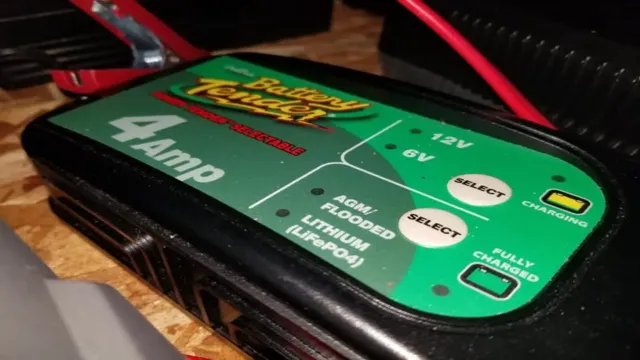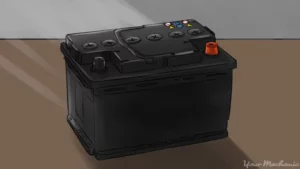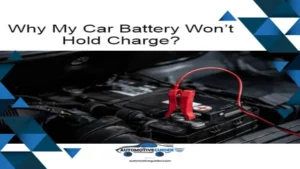Are you looking for information on how many amps are required for a car battery charger? Well, you’ve come to the right place! If you’re a car owner, you know how crucial it is to keep your battery charged and working correctly. And, if you’re planning to invest in a car battery charger, understanding how many amps it requires is essential. The amperage rating of a car battery charger indicates how much current it can provide to the battery in a specified amount of time.
It’s important to note that different car battery chargers have different amperage ratings, which affects the charging time of the battery. To determine the appropriate amperage rating for your car battery charger, you need to consider the battery capacity and the charging time. If you have a smaller battery capacity, you can opt for a charger that offers a lower amperage rating.
However, a larger battery would require a charger with a higher amperage rating to charge efficiently. Another factor to consider is the charging time. If you’re looking for a quick charging solution, it’s better to opt for a charger with a higher amperage rating.
However, it’s crucial to ensure that the charger you choose isn’t too high for your battery. In conclusion, understanding how many amps are necessary for your car battery charger is vital to ensure that your battery stays charged and in good working condition. Keep in mind that different chargers offer varying amperage ratings, and you must select one that is appropriate for your specific needs.
Stay tuned for more information on car battery chargers.
Understanding Car Battery Chargers
When looking for a car battery charger, one of the most important factors to consider is how many amps it provides. The number of amps will determine how quickly your battery will charge, and it’s essential to choose a charger that matches your battery’s requirements. Most car batteries require between 4 and 8 amps to charge, but this can vary depending on the battery’s size and condition.
It’s also important to note that using a charger that provides too many amps can cause damage to the battery or even cause it to explode, so it’s important to choose wisely. When selecting a charger, look for a model that provides the correct number of amps for your battery and has additional features like overcharge protection and automatic shut-off to ensure your battery stays in good condition.
Types of Car Battery Chargers
Car battery chargers come in different types, each with unique features that cater to specific situations. Understanding the different types of car battery chargers can help you choose the one that’s right for your needs. One type of charger is a trickle charger, which slowly charges the battery over several hours.
This type of charger is best for maintaining a battery’s charge over long periods and is ideal for cars that are not used frequently. Another type is a jump starter, which is used for emergency situations to jump-start a dead battery. Jump starters are portable and can be carried in the trunk of your car.
A third type is a fast charger, which quickly charges a battery in just a few hours. This type of charger is ideal for cars that are frequently used and need a quick charge. Whatever type of charger you choose, make sure it is compatible with your car’s battery and follow the manufacturer’s instructions for safe and effective use.

Factors Affecting Amp Rating
When it comes to understanding car battery chargers, it’s essential to know the factors that affect their amp rating. The amp rating of a charger indicates the amount of current that flows from the charger to the battery. The first factor to consider is the size of the battery.
The larger the battery, the more current it needs to reach full charge, and therefore, a charger with a higher amp rating is required. Another factor is the charger’s voltage output. If the voltage output is too high or too low, it can cause damage to the battery.
Additionally, the temperature can also play a role in the charger’s amp rating, as extreme temperatures can affect the charging process. It’s crucial to choose a charger with an appropriate amp rating for your car battery, as failure to do so can lead to overcharging or undercharging, both of which can damage the battery’s lifespan. Overall, understanding the factors that affect the amp rating of car battery chargers can help you choose the right charger for your specific needs.
Determining the Amp Rating for Your Car Battery Charger
When it comes to choosing the right car battery charger, one of the most important things to consider is the amp rating. But how many amps do you actually need? Well, that depends on the size of your car battery. A good rule of thumb is to choose a charger that can deliver at least 10% of your battery’s amp hour rating.
So, if you have a 50 amp hour battery, you’ll want a charger that can deliver at least 5 amps. However, it’s important to keep in mind that there are a few other factors that can impact your charger’s amp rating. For example, if your car battery is completely dead, you may need a higher amp rating in order to jump-start it.
Additionally, if you have an older battery that requires a lower charging rate, you’ll want to choose a charger with a lower amp rating as well. Ultimately, the key is to find a balance between a charger that can charge your battery quickly and one that won’t damage it over time. So, before you invest in a new car battery charger, make sure to take the time to calculate the proper amp rating for your battery and choose a charger that meets those needs.
Checking Your Car Battery’s Amp-Hour Rating
One of the most important things to consider when using a car battery charger is its amp-hour rating. This rating determines how long it will take to charge your battery fully. To determine the amp rating for your car battery charger, you need to know the amp-hour rating of your battery.
You can find this rating on the battery label or in the owner’s manual. Once you have this rating, you need to choose a charger with an amp rating between 10-30% of the battery’s amp-hour rating. For example, if your battery has an amp-hour rating of 60 Ah, you should choose a charger with an amp rating between 6-18 amps.
Choosing a charger with a higher amp rating can damage your battery, while choosing a lower amp rating can take too long to charge it. Therefore, it’s essential to select the right charger to preserve your battery’s life and ensure it’s always ready to serve your needs.
Calculating Charger Amp Rating
If you’re looking to charge your car battery, you need to determine the amp rating of your charger. The amp rating refers to the amount of electrical current that flows into your battery at a given time. Determining the right amp rating for your charger is essential to avoid damaging your battery or having to wait a long time for it to charge fully.
To calculate the amp rating, you first need to know the capacity of your battery. This information can be found in your car manual or by checking the label on your battery. Once you have the battery’s capacity in amp-hours, you can determine the amp rating of your charger.
For example, if your battery capacity is 60 amp-hours, you should use a charger with an amp rating of at least 6 amps to charge it efficiently. Keep in mind that charging your battery too quickly with a high amp rating can damage it, so always make sure to select a charger with the appropriate amp rating for your battery.
Recommended Amp Rating for Different Car Battery Sizes
If you’re in need of a car battery charger, it’s important to consider the amp rating needed for your specific battery size. The larger the battery, the more amps you’ll need to fully charge it. Generally speaking, a 12V car battery will require at least 4-6 amps for a standard charge, while a 24V battery will need around 8-12 amps.
However, it’s always best to check the manufacturer’s specifications to ensure you’re using the correct charger for your battery. Using a charger with too low of an amp rating can result in a longer charging time, while using a charger with too high of an amp rating can damage the battery. So, before purchasing a car battery charger, determine the size of your battery and research the recommended amp rating from the manufacturer.
Small Car Batteries
Small car batteries are often categorized by their size and ampere rating. It is essential to choose the right amp rating for your car, otherwise, it may not start or run smoothly. The amp rating is the measure of the battery’s electrical capacity, which is determined by the size and type of the vehicle.
For instance, a small car battery, such as a group 24F, typically has an amp rating of 550 to 600 cold cranking amps (CCA). However, a larger car battery, for instance, a group 31, may have an amp rating between 900 to 1000 CCA. If you are unsure of the right battery size and amp rating for your car, consult your owner’s manual or a professional mechanic.
It is always better to choose a battery with a slightly higher amp rating than you need to ensure that it can handle all the electrical systems in your vehicle, especially during extreme weather conditions. Overall, picking a battery with the correct size and amp rating will help your car start faster and run smoothly.
Medium Car Batteries
When it comes to choosing the right size of car battery, it’s important to also consider the recommended amp rating for that size. For medium car batteries, which are typically used in sedans and smaller SUVs, a recommended amp rating of at least 500-600 CCA (cold cranking amps) is ideal. This ensures that the battery has enough power to start your vehicle even in cold weather conditions.
However, it’s also important not to oversize your battery in terms of amp rating, as this can lead to battery damage and other issues. As with any car battery, it’s important to choose a reputable brand and ensure that the battery is properly installed and maintained for optimal performance and longevity. By taking the time to choose the right size and amp rating for your medium car battery, you can ensure that your vehicle starts reliably and runs smoothly on the road.
Large Car Batteries
Large car batteries come in various sizes, and the recommended amp rating differs depending on the size of the battery. A general rule of thumb is that the larger the battery, the higher the amp rating should be. For example, if you have a car battery that’s 48 amp-hours, you should look for an amp rating of around 3-4 amps.
On the other hand, if you have a larger battery that’s 100 amp-hours or more, you should aim for an amp rating of around 6-8 amps. This will help to ensure that your battery is charged efficiently and that it has the power it needs to start your car each time. It’s always a good idea to consult with a professional or check your car’s manual to find the recommended amp rating for your specific make and model.
By using the right amp rating, you can help to prolong the life of your battery and keep your car running smoothly.
Deep Cycle Batteries
When it comes to deep cycle batteries, choosing the right amp rating for your car battery size is crucial. The recommended amp rating can vary depending on the size of the battery, so it’s important to do your research before making a purchase. For example, a smaller car battery may only require an amp rating of around 25-30 amps, while a larger battery may need closer to 50-60 amps.
It’s also important to consider any additional power requirements, such as for electronic devices or accessories, when selecting the appropriate amp rating. Ultimately, choosing the right amp rating can help ensure your deep cycle battery is able to power your vehicle’s electrical system effectively, providing reliable performance and long-lasting operation.
Conclusion
When it comes to answering the age-old question of how many amps are needed for a car battery charger, the answer is not a one-size-fits-all. It depends on the type and size of the battery as well as the charger itself. However, it’s always better to err on the side of caution and choose a charger with a slightly higher amp rating than what’s needed.
Remember, you don’t want to be stuck with a dead battery on a deserted road, so take the time to do your research and choose the right charger for your specific needs.”
FAQs
What is the recommended amperage for a car battery charger?
The recommended amperage for a car battery charger is between 2 and 10 amps, depending on the size of the battery.
Can I use a 50-amp charger for my car battery?
It is not recommended to use a 50-amp charger for a car battery as it can overcharge and damage the battery.
How long does it take to fully charge a car battery with a 10-amp charger?
It typically takes around 6-10 hours to fully charge a car battery with a 10-amp charger.
Is it safe to leave a car battery charger on overnight?
It is generally not recommended to leave a car battery charger on overnight as it can overcharge the battery and cause damage.
Can a car battery explode while charging?
Yes, a car battery can potentially explode while charging if it is overcharged or there is a spark.
How often should I charge my car battery?
It is recommended to charge your car battery once a month to maintain its health and prevent it from dying.
Can I use a trickle charger for my car battery?
Yes, a trickle charger is a safe and effective way to maintain the charge on your car battery when it is not in use for an extended period of time.






